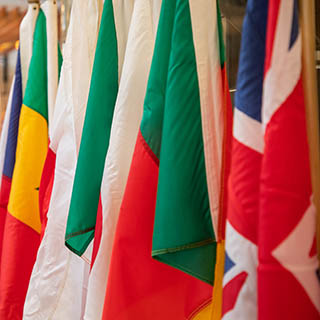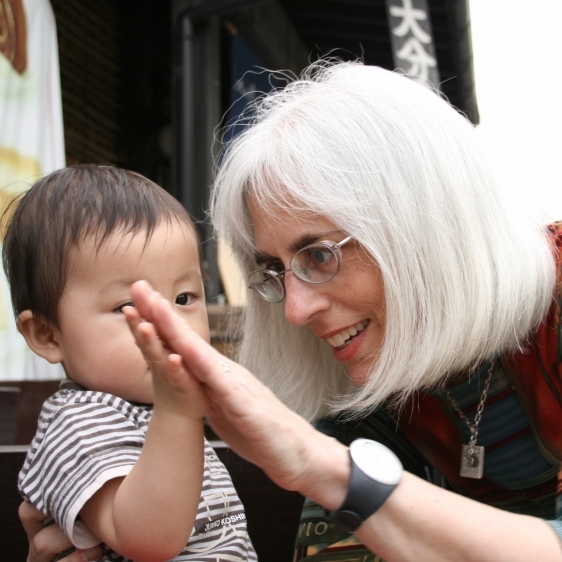Emeritus Faculty
Judith N Rabinovitch
Karashima Tsukasa Prof. Emerita of Japanese Language and Culture
Contact
- rabinovitchj@mso.umt.edu
- Office Hours
Prof. Rabinovitch has retired from UM effective May 2015 but may be reached at any time through email; please contact the MCLL department for details.
Recent Highlights: Judith is completing a book on Sinitic verse from the Heian court with her husband Tim Bradstock and in summer 2017 received a Japanese Foreign Minister's Commendation for her career contributions to Japanese studies and research.
Education
B.A., University of Washington, in Far Eastern Languages and Literatures; M.A., Ph.D., Harvard University, in East Asian Languages and Civilizations
Courses Taught
Prof. Rabinovitch's primary research interest is classical kanshi (poetry in Chinese) with a particular focus on the poetry of the Heian period (ca. 900-1200). A secondary interest is the linguistic evolution of “variant Chinese” literary styles and kuge nikki, courtier diaries in variant Chinese dating from the Heian and Kamakura periods. At UM, Judith taught the history of the Japanese language and survery courses on Japanese literature of all periods, as well as modern and classical Japanese.
Teaching Experience
Prof. Rabinovitch taught Japanese at The Ohio State University, Yale University, and Auckland University in New Zealand before joining the faculty at UM.
Other past academic affiliations:
Special Project Professor, Kyushu University
Visiting Professor at International Research Center for Japanese Studies, Kyoto
JSPS Research Fellow, Yokohama University and Nagoya University
Japanese Ministry of Education Invited Professor, Shokei University
SSRC/Japan Foundation Dissertation Research Fellow, Waseda University
Tokyo; Graduate Research Affiliate in Japanese Literature, Kyoto University
Teaching Fellow, College of Arts and Sciences, Harvard University.
Research Interests
Prof. Rabinovitch has a particular interest and expertise in kanshi (poetry in Chinese) of the Nara and Heian periods (ca. 700-1200). A secondary interest is the linguistic evolution of “variant Chinese” literary styles and kuge nikki, courtier diaries in variant Chinese dating from the Heian and Kamakura periods. Judith is currently working with Prof. Timothy R. Bradstock on a second anthology of Heian kanshi poetry. With Tim, she has published two additional books devoted to somewhat more recent Edo-period kanshi, including a volume dealing with a private collection of informal, decorative ‘tanzaku’ kanshi composed by artists, writers and scholars living in Kyoto during the 18th and 19th century. Judith gratefully acknowledges past research support from the Japan Foundation, the Social Science Research Council, the Japan Society for the Promotion of Science, the International Research Center for Japanese Studies, Fulbright, Yale University Council on EA Studies, The Ohio States University, and the Japanese Institute of Harvard University.
Projects
WORK IN PROGRESS:
The Diary of Lady Kenju Gozen, ca. 1219; a study and translation of an early 13th century diary written by a leading female court poet and high-placed lady-in-waiting, the daughter of Fujiwara no Shunzei
Field of Study
Japanese language and literature, with a special interest in classical literature and poetry, both in the vernacular and in Chinese domesticated styles. Judith's research specialization is Japanese literature recorded in variant Chinese styles, in particular, the early war tales, poetry (the kanshi genre), and private courtier diaries (kuge nikki).
Selected Publications
BOOKS/MONOGRAPHIC STUDIES
“Paulownia Leaves Falling: The Kanshi Poetry of Inaga Nanpo (1865-1901) Japan Review 21 (August 2009), International Research Center for Japanese Studies, Kyoto. With Timothy R. Bradstock.
Dance of the Butterflies: Chinese Poetry from the Japanese Court Tradition: Translated and Edited with Introductions and Commentaries,Cornell University’s East Asian Monograph Series, 2006. With Timothy R. Bradstock.
The Kanshi Poems of the Ozasa Tanzaku Collection: Late Edo Life through the Poetry of Kyoto Townsmen. International Research Center for Japanese Studies Monograph Series, #5. International Research Center for Japanese Studies, Kyoto, 2002. With Timothy R. Bradstock.
An Anthology of Kanshi [Chinese Verse] by Japanese Poets of the Edo Period (1603-1868): Translations of Selected Poems with an Introduction and Commentaries. The Edwin Mellen Press, NY, 1997. With Timothy R. Bradstock.
“Wasp Waists and Monkey Tails: A Study and Translation of Hamanari's Uta no shiki [The Poetic Code, 772], also known as Kakyo Hyoshiki [A Formulary for Verse Based on the Canons of Poetry],” in Harvard Journal of Asiatic Studies 51.2 (Dec 1991).
Shomonki: The Story of Masakado's Rebellion, pub. by Monumenta Nipponica [Monograph series #58] (Tokyo: Sophia University, 1986).
Publications
"The Road Not Taken: A Tenth-Century Kanshi Dialogue, translated with commentaries," by Judith Rabinovitch and Timothy Bradstock; forthcoming in Sino-Platonic Papers, 2017
Kanshi in Literary Sinitic of the Japanese Court; a Study and Translation of Selected Works, approx. 400 pp., forthcoming 2017.
* * *
“Early Edo Kanshi Poetry,” with Timothy Bradstock, in the Cambridge Encyclopedia of Japanese Literature, edited at Columbia University, 2016
“Paulownia Leaves Falling: The Kanshi Poetry of Inaga Nanpo (1865-1901),” with Timothy Bradstock, in Japan Review 21 (Aug 2009), journal of the International Research Center for Japanese Studies, Kyoto), pp. 33-122.
An Anthology of Kanshi [Chinese Verse] by Japanese Poets of the Edo Period (1603-1868): Translations of Selected Poems with an Introduction and Commentaries, Timothy R. Bradstock and Judith N. Rabinovitch. The Edwin Mellen Press, NY, 1997
“Nihongo no Midare to Mirai ” (The Chaotic State of the Japanese [Honorific] Language and Its Future,” in Japanese, published in Nichibunken (Journal of Japanese Studies Research) no. 2 (Spring 2001), pub. by the International Research Center for Japanese Studies, Kyoto
“An Introduction to Variant Chinese, a Hybrid Sinico-Japanese Used by the Male Elite in Premodern Japan,” Journal of Chinese Linguistics (University of California, Berkeley) vol. 24, no. 1 (Jan 1996)
“Some Literary Aspects of Four Kambun Diaries of the Japanese Court: Translations with Commentaries of Excerpts from Uda Tenno Gyoki, Murakami Tenno Gyoki, Gonki, and Gyokuyo,” in The Journal of the Humanities, Sec. II, no. 39, Yokohama University (Oct 1992)
“Wasp Waists and Monkey Tails: A Study and Translation of Hamanari's Uta no shiki [The Poetic Code, 772], also known as KakyÅ HyÅshiki [A Formulary for Verse Based on the Canons of Poetry],” in Harvard Journal of Asiatic Studies 51.2 (Dec 1991), pp. 471-560
ShÅmonki: The Story of Masakado's Rebellion, pub. by Monumenta Nipponica [Monograph series #58] (Tokyo: Sophia University, 1986)
“Hentai Kanbun” and “Toyo Kanji” in Encyclopedia of Japan (Kodansha), 1983
Affiliations
Association for Asian Studies
Association of American Teachers of Japanese
Fulbright Alumni Association
Japan Society for the Promotion of Science Alumni Association
Specialized Skills
Judith has a teaching degree (jun-shihan) and natori status in shamisen (a three stringed traditional Japanese instrument) with the Fujimoto School (Tokyo); she is also famiiar with the nagauta repertoire for shamisen. Whie attending school in Sendai and Kyoto, Judith studied sumi-e (monochrome) painting, flower arranging, koto, and shodo (calligraphy).
Professional Experience
Japanese translation and interpretation; transcription and translation of art inscriptions in Chinese and Japanese
International Experience
Overseas research fellowships held in Tokyo, Yokohama, Kyoto, and Nagoya; teaching appointments in Kumamoto, Japan, in Shanghai, People's Republic of China, and in Auckland, New Zealand. Other periods spent in Canada and England.
Honors / Awards
Phi Kappa Phi, University of Montana; University of Montana Faculty Teaching Honor Citation; Distinguished Service Award from Shanghai International Studies University; Yale University Council on East Asian Studies Research Grant; Fellow of Calhoun College, Yale University; Japan Institute of Harvard University Research Grant; President's Medalist, University of Washington; Phi Beta Kappa, University of Washington; Japan-America Society Award (Seattle area); other research grants/support from Japan Forum, Japan Foundation, Nichibunken (IRCJS), JSPS, Fulbright-Hayes, SSRC, and the Ministry of Education, Japan.


